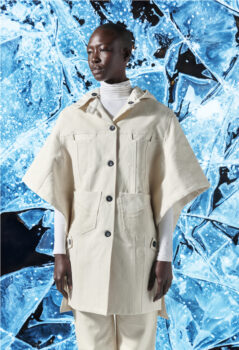 The Lenzing Group, a leading supplier of regenerated cellulose for the textile and nonwovens industries, has created a unique, innovative concept that contributes to the sustainable protection of our glaciers while inspiring collective action for sustainable practices and a circular economy in the nonwovens and textile value chain. The presentation titled “Glacial Threads: From Forests to Future Textiles” took place as part of the International Day of Forests celebrations at the Palais des Nations, United Nations Office, Geneva.
The Lenzing Group, a leading supplier of regenerated cellulose for the textile and nonwovens industries, has created a unique, innovative concept that contributes to the sustainable protection of our glaciers while inspiring collective action for sustainable practices and a circular economy in the nonwovens and textile value chain. The presentation titled “Glacial Threads: From Forests to Future Textiles” took place as part of the International Day of Forests celebrations at the Palais des Nations, United Nations Office, Geneva.
The melting of glaciers is being severely impacted by global warming. Geotextiles are used to protect ice and snow. However, the nonwovens used for this are made of fossil-based fibers, which allow microplastics*[1] to enter the valley via streams and may enter the food chain through small organisms and animals. Nonwovens made from cellulosic LENZING™ fibers, which are biodegradable at the end of their life cycle and can be completely recycled, are the sustainable solution to this problem.*[2]
The covering of a small area with the new material made from LENZING™ fibers was tested for the first time during a field test on the Stubai Glacier. Four meters of ice were saved from melting. This was confirmed in a study conducted by the University of Innsbruck and the Austrian glacier lift operators on the Stubai Glacier in Tyrol (Austria). In 2023, the pilot project was successfully extended to all Austrian glaciers used by tourists. “We are delighted with the positive results and see the project as a sustainable solution for glacier protection – not only in Austria, but also beyond the country’s borders,” says Berndt Köll, Emerging Business Development at Lenzing.
Last year, the project was also awarded first place in the prestigious Swiss BIO TOP Awards for wood and material innovations.
Commitment to circularity
Lenzing takes this pioneering innovation project as an opportunity to inspire collaborative action towards sustainable practices and circularity in the textile value chain. Together with a network of committed and innovative partners, Lenzing is working on processing geotextiles into new textile fibers giving them a second life as a garment. The use of geotextiles is usually limited to two years, after which the nonwovens would be disposed of. In the first phase of the pilot project, the recycling of nonwovens made for geotextiles use has been successfully tested and a fashionable “Glacier Jacket” has been produced, showcasing that the recycling of geotextiles is viable. Next to Lenzing, the network includes Marchi & Fildi Spa, a specialist in the field of mechanical recycling, the denim fabric manufacturer Candiani Denim and the avant-garde fashion studio Blue of a Kind.
 Florian Heubrandner, Executive Vice President Commercial Textiles at Lenzing: “This pioneering innovation project brings together trusted like-minded companies and partners across the supply chain, demonstrating the companies’ shared vision and commitment to the circular economy. The collaboration is a testament to the power of partnership; driving innovation and sustainability, reducing environmental impact and encouraging collaborative action against climate change for global impact across in the textile industry.”
Florian Heubrandner, Executive Vice President Commercial Textiles at Lenzing: “This pioneering innovation project brings together trusted like-minded companies and partners across the supply chain, demonstrating the companies’ shared vision and commitment to the circular economy. The collaboration is a testament to the power of partnership; driving innovation and sustainability, reducing environmental impact and encouraging collaborative action against climate change for global impact across in the textile industry.”
Krishna Manda, Vice President Corporate Sustainability at Lenzing: “As the climate emergency accelerates glacier melting, we are at a critical point requiring transformative change for global impact. Nature stimulates our creativity and inspires us to truly innovative ideas. As part of Lenzing’s ongoing commitment to intertwine innovation and sustainability, this pioneering project represents the balanced connection between technology and nature, showcasing collaborative circular sustainable practices whilst acting as a rallying call for collective action. Together with our network of passionate industry experts, we can lead towards a substantial positive impact on our planet, safeguarding future generations. This project is an example to show the power of possibility when we collaborate together.”
The innovative concept, which was artistically staged by one of the most influential contemporary artists, the Italian Maestro Michelangelo Pistoletto, was presented on March 21, 2024, as part of the International Day of Forests celebrations at the Palais des Nations, the headquarters of the United Nations Office at Geneva (UNOG).
*[1] Senathirajah et al., 2021, J.Hazard Mater
*[2] LENZING™ fibers which are TÜV certified biodegradable (soil, fresh water & marine) and compostable (home & industrial) include the following products: LENZING™ Viscose Standard textile/ nonwovens, LENZING™ Lyocell Standard textile/nonwovens, LENZING™ Modal Standard textile, LENZING™ Lyocell Filament, LENZING™ Lyocell Dry and LENZING™ Web Technology. An exception in certification applies for the fibers LENZING™ Lyocell Filament and LENZING™ Lyocell Dry, for which the necessary tests for confirming biodegradability in marine environment were not yet done or finalized.


















